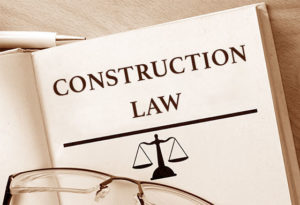 Construction works are usually exposed to unforeseen circumstances and unexpected events (natural hazards) that can result in unforeseen losses for a Contractor. To avoid unforeseen losses that can make a project a loss for a contractor, it is important that the Contractor’s Lawyer identify potential risks and seek to negotiate their allocation between his client and the employer (party procuring work) during the contract formation stage.
Construction works are usually exposed to unforeseen circumstances and unexpected events (natural hazards) that can result in unforeseen losses for a Contractor. To avoid unforeseen losses that can make a project a loss for a contractor, it is important that the Contractor’s Lawyer identify potential risks and seek to negotiate their allocation between his client and the employer (party procuring work) during the contract formation stage.
The idea is that since such risks emanate from circumstances not the due to the fault of either party, it is only fair that each party takes a role in absorbing the costs. Thus, the industry is well advised not to place all risks on the contractor. To do so will lead to higher tender prices and the attendant risk of less competent contractors wining bids.
The main concern of a construction lawyer as indeed construction contracts is therefore the prior and equitable allocation of risks. In this, the starting point is to identify and assess the risks upon which decisions will be taken on their allocation. Following this is the question who shall bear what?
Risks which the Contractor can bear:
First, in the efficient management of risks, contractors, should decide which risks they can accept and manage (such as those arising from government policy and economy) or better still those risks they can pass on to insurance policies (such as personal injury and damage to equipment).
Secondly, there are risks which arise from third parties (i.e. manufacturers, suppliers, subcontractors) and which risks (design, maintenance risks, workmanship) are best passed on to those third parties.
Risks which the Employer can bear:
Force Majeure:
This usually refer to an extraordinary event or circumstance beyond the control of a party which prevents the party from fulfilling his/her obligation under the contract, temporarily or permanently. In construction, such risk is more fairly borne by the employer as it manifests independently of the will of the contractor (completely out of his control) to prevent or delay the performance of the contract.
The unavoidability of an event and its consequences are sufficient factors to constitute force majeure in some jurisdictions. While in others such as France, there is the added requirement of unpredictability.In other words, where the event was reasonably foreseeable, the party concerned is expected to have taken such event into account at the time of making the contract. If he does not, he will be liable for any damage that result.
Thus in the English case of Matsoukis v. Priestman & Co [1915], the Court held that force majeure could not be extended to cover bad weather, football matches or a funeral, saying “these are the usual incidents interrupting work and the defendants, in making their contract, no doubt took them into account…”.
There are 2 categories of force majeure though some legal systems combine them as one.
The first are those occurrences commonly referred to as Acts of God. These are natural disasters that include flood, volcanic eruptions, earthquakes, hurricanes etc. The second category consist of extraordinary events triggered by human acts or technical failures. These include wars, terrorist attacks, riots, strikes, labour disputes resulting in strikes, lockouts, power outages etc.
There is much less disagreement on what constitutes force majeure when it comes to natural disasters. However, there is much controversy as to what human acts or technical failures can constitute force majeure, particularly as some jurisdictions completely exclude such category of events.
In the circumstance, it makes good commercial sense for construction contracts (notably in Nigeria) to expressly define force majeure and state the extraordinary occurrences or circumstances, acts of God or otherwise, that can constitute it.
In certain cases, a force majeure event may result in delay as opposed to total non-performance. In such cases, a force majeure clause should make provision for the Contractor to be allowed additional time to complete the works.
Other Liabilities:
When a Contractor fails to complete work within the time frame stipulated or within a reasonable time thereafter, he can be liable to pay penalties or liquidated damages without a limit for the delay in completing works. Likewise, a Contractor is typically liable for damage or injury which arise from his/her default or negligence without any limitation.
In such cases, a Contractor’s Lawyer will do well to suggest a limit as to the penalty or liquidated damages payable for his client’s liabilities.





Pingback: Dream and Legacy 'HOW TO' Manifesto - "REBUILD INSTITUTION" - Dream and Legacy